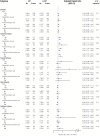Risk of Alzheimer's disease and Parkinson's disease following androgen deprivation therapy in a real world nationwide cohort
- PMID: 40603530
- PMCID: PMC12223037
- DOI: 10.1038/s41598-025-08279-6
Risk of Alzheimer's disease and Parkinson's disease following androgen deprivation therapy in a real world nationwide cohort
Abstract
The association between androgen deprivation therapy (ADT) and dementia including Alzheimer's disease remains debatable. Moreover, the evidence regarding the risk of vascular dementia and Parkinson's disease associated with ADT is limited. A population-based cohort study was conducted using the national health insurance data (2012-2022) from South Korea. Eligible patients newly diagnosed with prostate cancer who underwent ADT were compared with those who did not receive ADT. We applied propensity score matching and performed Cox proportional hazards regression analysis to calculate the adjusted hazard ratios (aHR) and 95% confidence intervals (CI). Of 163,723 patients with prostate cancer between 2013 and 2017, 24,456 were eligible. After 1:1 propensity score matching, 10,168 patients were included in each group. The risk of overall dementia was not significantly higher in ADT users compared with that of non-users (aHR = 1.07; 95% CI: 0.97-1.19); however, the elevated risk of Alzheimer's disease was observed (aHR = 1.39; 95% CI: 1.21-1.59). ADT was not associated with the risk of vascular dementia (aHR = 1.14; 95% CI: 0.70-1.94) and Parkinson's disease (aHR = 1.01; 95% CI: 0.75-1.35). Our updated evidence reinforces previous findings, indicating a positive association between ADT and the risk of Alzheimer's disease. However, it is unlikely that ADT increases the risk of vascular dementia and Parkinson's disease.
Keywords: Alzheimer’s disease; Androgen deprivation therapy; Dementia; Parkinson’s disease; Prostate cancer.
© 2025. The Author(s).
Conflict of interest statement
Declarations. Ethics approval and consent to participate: This study was approved by the Institutional Review Board of Ajou University (202305-HB-EX-001), which waived the requirement for informed consent as only de-identified data were used. Competing interests: The authors declare no competing interests.
Figures



References
-
- Cancer IAfRo. Cancer Today; Data visualization tools for exploring the global cancer burden in 2020, (2024).
-
- Siegel, R. L. et al. Cancer statistics, 2023. CA Cancer J. Clin.73(1), 17–48 (2023). - PubMed
MeSH terms
Substances
Grants and funding
LinkOut - more resources
Full Text Sources
Medical

